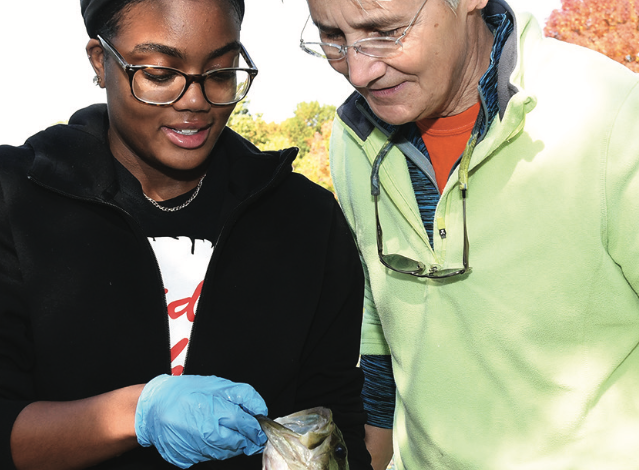
Electrofishing at Rider’s lake
By Amethyst Martinez
At the epicenter of campus, the Rider lake’s algae buildup and hammocks nearby have drawn almost every student to its wonder: whether that be good or bad. On Oct. 12, students of a Future of Natural Resources class and their professor Kathleen Browne ventured out to collect data on the creatures that reside in the infamous lake.
The New Jersey Department of Environmental Protection (NJDEP) Division of Freshwater Fisheries came to Rider and helped the class gather the fish and collect data, according to Browne.
“Since 2014, we’ve been looking at the adult fish population every three
to four years, depending on when the DEP can come out and help us,” said Browne. “We gather as many adult fish as possible, we identify them and then we do some data analysis.”
The project varies from year-to- year, but this year, students weighed and measured the fish, in addition to checking to see if there was any crossbreeding among the species.
“We’re going to look at length as a way to estimate age, because it turns out, they grow in predictable ways, right?” said Browne. “We use up a conversion table to figure out for this specific length, what is its likely age, and then we’ll look at age distribution to see if we do have a variety of ages, which would be a good sign. If we only have one age for example, then that’s probably not a good sign. … Even if they’re reproducing, their offspring isn’t necessarily surviving, at least from the snapshot of data that we collect.”
Browne said that if they do see a trend of one age amongst their data, that would indicate that there are too many predators, or that the environmental conditions aren’t healthy enough for the fish to survive.
“I think it’s more predators in our case than anything else, because the water quality is pretty good,” said Browne.
According to Browne, there are five species of fish in the lake: largemouth bass, brown bullhead catfish, American eels and two varieties of sunny fish called pumpkinseed and bluegill.
DEP fishery biologist specialist for the Lower Delaware Watershed
Warmwater Fisheries Management, Invasive Species, & Federal Aid Chris Smith, along with other DEP staff, explored the lake in their boat and fished using a method called electrofishing to temporarily stun the fish, according to Browne.
“They chose to use ‘electrofishing’, which they use all over the state in streams and lake[s]. It is a non-lethal approach that momentarily stuns fish so they can be quickly scooped up, [and] added to a tank on board their boat where they revive,” said Browne.
After the DEP went out and collected adult fish, the students were on the grassy sidelines waiting to inspect, measure and weigh the aquatic creatures.
Kiley Kearney, a sophomore psychology major, said she hasn’t experienced hands-on education like this in any of her college classes.
“You can really tell the difference in person versus just viewing [the fish] on a screen, so I thought that was really cool,” said Kearney.
Browne said that they released the fish back into the lake once they were done measuring them offshore, and the fish that they handled seemed completely revived when they went back in.
Another thing that Browne pointed out was the algae buildup in the lake that many have noticed in recent months, which she said was caused by too many nutrients in the water.
“Every lake water body in New Jersey has trouble. For obvious reasons, too much algae right now is what we see in our lake … but that doesn’t mean it’s toxic. For fish, we actually have a pretty healthy lake,” Brown said before jokingly saying to not to tell anyone in her classroom since that’s what they’re currently investigating.
Browne said that hands-on experiences such as this can really strengthen a student’s understanding of these topics.
“Willingness to touch a fish and measure them and all that stuff tells me that students find it more engaging than just being lectured at … or some who are seemingly nervous about touching and holding a live fish, [and] they’ll do it anyway, so that is a great outcome,” said Browne.


